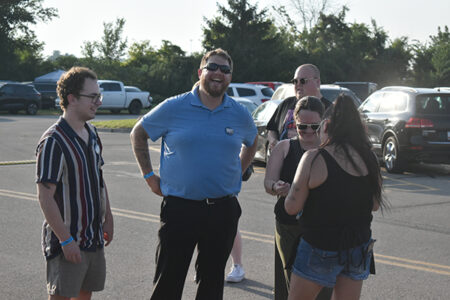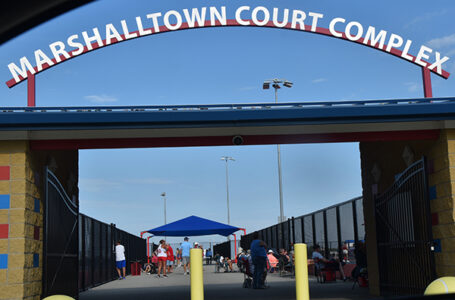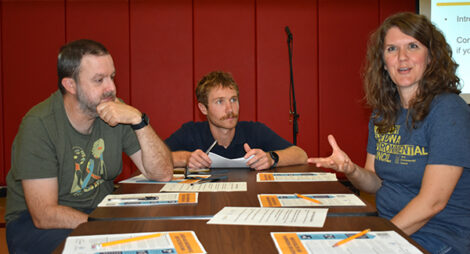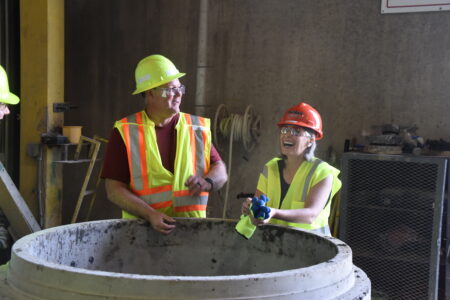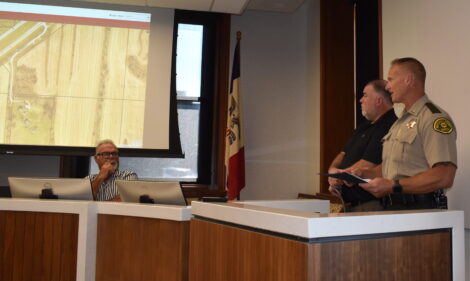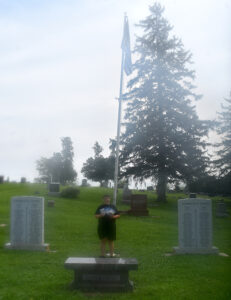City officials looking to change bike, skateboard ordinance
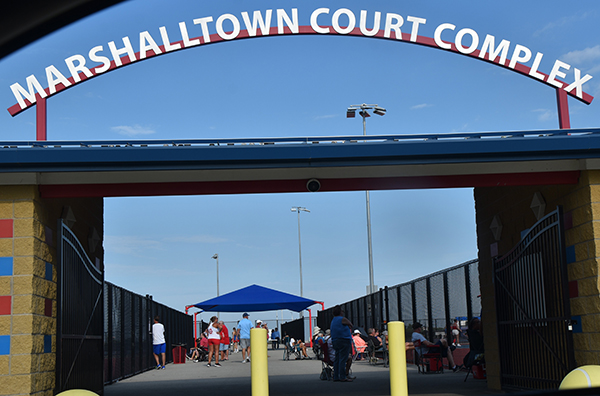
T-R PHOTO BY LANA BRADSTREAM — Marshalltown residents watch a tennis match at the high school complex Thursday. The city council approved the first reading of an ordinance prohibiting bicycle and skateboard riding on tennis courts, including the complex at the high school.
Bicyclists and skateboarders could see some changes in ordinances regarding their wheeled transportation units.
The Marshalltown City Council unanimously approved a first reading of an ordinance amending rules regarding bicycles, skateboards and other recreational vehicles.
Police Chief Chris Jones told the councilors during the regular Monday meeting that staff have worked during the last month to revise Chapter 73: Recreational Vehicles for Bicycles and Skateboards and Associated Code References. The reason for the work was to make it more contemporary, and include electric bikes (ebikes) and electric scooters (e-scooters).
“What the ordinance also does is narrow down anything with a seat or handlebars to be classified as a bicycle, which would mean a rider would need to obey all general traffic laws if ridden on a city street and the bike lanes uptown in the central business district,” he said.
For skateboards or devices without seats or handlebars, Jones said the options for riding would be limited to sidewalks throughout the city.
“Hoping that will be a little bit safer for drivers and pedestrians,” he said.
Jones said they modified a section of the chapter, trying to indicate a clear separation between motor vehicles and ebikes. The reason for that, he said, is to make it easier for the public and Marshalltown Police Department (MPD) officers to understand the differences.
Councilor Jeff Schneider inquired about the section prohibiting bikes, skateboards and other devices from being ridden on tennis courts. He asked why other sport courts, such as pickleball, were not included and if the definition should be broadened.
Jones told Schneider it depends, but the ordinance prohibited riding on tennis courts and so staff left it in the new version.
“We hadn’t taken it into consideration that we could change or broaden the definition of courts,” he said.
Schneider also asked about public property, and why school district property was not mentioned.
“Is that something we don’t want to cover?” he asked.
Jones said they could figure out where to add other types of public property, such as those belonging to the school district.
Schneider also asked how the ordinance would apply to private property, such as a hospital or business parking lot.
“If they have a sign posted, ‘No trespassing,’ I mean it is a public parking lot, so I don’t know how they could do that,” he said. “How do we cover that with our ordinances?”
According to Jones, it would be up to the private owner of the parking lot to notify the MPD.
“We would come down and do what they wish,” he said. “If they asked us to remove people utilizing that with skateboards, we could go and notify them. But they would be responsible for their own private property, much like the school district if they decided to do something different on their sidewalks or paths.”
Jones said if district officials chose, they would put the restrictions in the rules and regulations. He added the public tennis courts at Marshalltown High School are included in the city’s prohibited areas.
Mayor Joel Greer said the most interesting aspect for him was that the ordinance declared 28 mph as the maximum cutoff speed for ebikes.
“If somebody’s got a good ebike and they’re pedaling, you can exceed that,” he said.
Jones told the mayor they tried to limit the maximum speed to a level 3 ebike. A level 3 ebike can achieve the speed of 28 mph, and is the fastest legal ebike. However, they do not need to be registered, so they are in a different category than mopeds and motorcycles.
“That would keep it under where we would typically see a registered moped,” Jones said.
Seeking clarification, Councilor Garry Thompson asked Jones about the use of the word “highway” in the ordinance. Jones told him it is a general police term and is used for all roads.
All council members voted in favor.
Councilor Melisa Fonseca asked Jones if anything had happened to cause the ordinance changes. Jones told her e-scooters were one of the issues, as they are not classified with skateboards or bicycles.
“Officers are having a difficult time distinguishing where the ordinance fell in obeying regular traffic rules – stop signs, riding on the street,” he said. “It was impossible for us to enforce that without the clarity of defining one as a bicycle or one as a skateboard.”
Resident Tim Bradbury said he had seen people of all ages utilizing the devices, and was curious if there is a difference between law enforcement stopping adults and stopping minors. Jones clarified that the rules apply to all ages. He added that the ordinance also requires lights on the front and back of bicycles if ridden on the roadways when it is dark.
The next step is for the council to approve the second reading.
——-
Contact Lana Bradstream
at 641-753-6611 ext. 210 or
lbradstream@timesrepublican.com.

